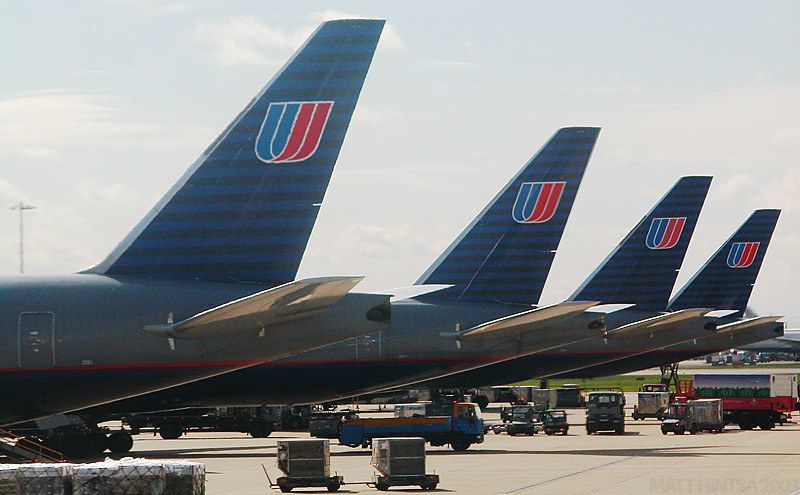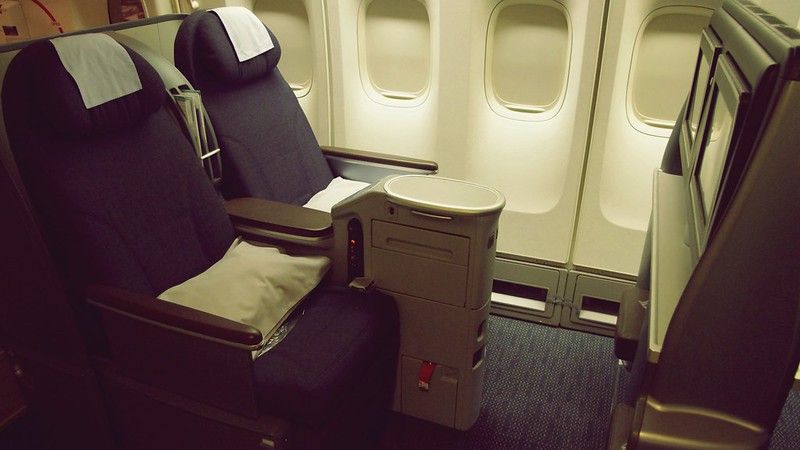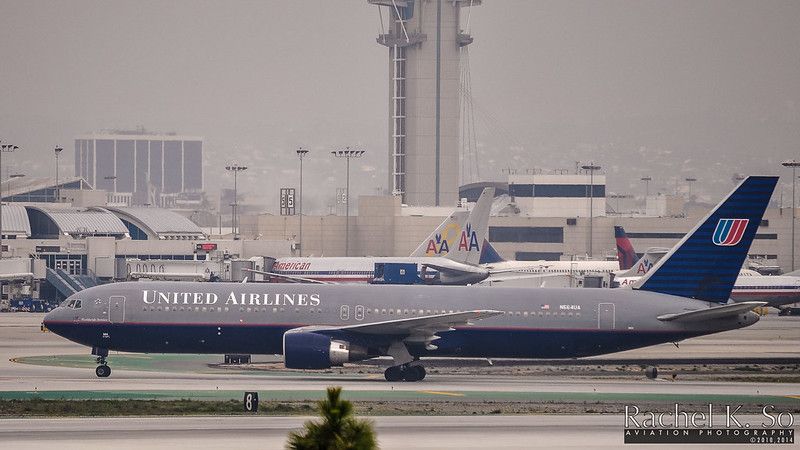If you've flown United recently, you were part of an elaborately orchestrated operation where artificial intelligence (AI) works tirelessly behind the scenes to elevate the travel experience. From handling delays to improving pilot communications and far beyond, AI is transforming how United operates. Let's explore the fascinating ways this airline is leveraging AI's immense potential.
The Driving Force

"United Airlines 777s" by matt.hintsa is licensed under CC BY-NC-ND 2.0.
Jason Birnbaum's AI Vision
United's trailblazing AI adoption hasn't happened by chance - it has been strategically spearheaded by Jason Birnbaum, the company's Chief Information Officer since 2022. With over 1,500 employees and 2,000 contractors under his guidance, Birnbaum is laser-focused on integrating AI across United's worldwide operations.
As a veteran brought in from leadership roles at GE, Birnbaum understands the airline industry's intense urgency around seamless operations. As he puts it, "Even a tiny 15-minute delay gets plastered all over social media and news outlets. It's a high-pressure business where hiccups can't be ignored." Implementing AI provides United with a powerful solution to proactively minimize disruptions.
The Great Cloud Migration for Maximized Artificial Intelligence Capabilities
For an airline to truly capitalize on AI, it requires robust cloud computing resources - which is why United has been diligently transitioning to Amazon Web Services (AWS) as its preferred cloud provider. This pivotal shift opens up scalable, on-demand computing power perfectly suited for United's accelerating AI integration.
However, migrating from United's entrenched "legacy" computer systems to the cloud is no simple task. Birnbaum's team is meticulously optimizing this process every step of the way through tactics like:
- Adopting automation and DevOps practices to streamline development workflows
- Enhancing cloud cost-optimization and reliability
- Judiciously maintaining a few mission-critical on-premise legacy systems when necessary for performance, privacy, or security reasons
While decommissioning major legacy platforms like an outdated Unisys system this year, United remains cautious about preventing any service disruptions during the transition. The end goal? Positioning United to maximize AI's capabilities on a future-proof cloud foundation.
Artificial Intelligence’s Seamless Notifications
One of the most customer-facing and impactful ways United leverages AI is through intelligent flight notifications. We're all too familiar with those vague "Delayed" alerts that leave you wondering what's actually going on, right? United has solved that painfully opaque experience.

Photo from: Pixabay
Thanks to AI, when your flight is delayed, you now receive a detailed, contextualized explanation via the United app and text messages. The AI system adeptly synthesizes data flowing in from crew communication channels, maintenance logs, and other real-time inputs to author those helpful notifications. No more being left in the dark when disruptions arise!
United's commitment to transparent AI-driven communication extends to its digital channels too. The airline recently rolled out an AI-powered chatbot on its website to provide instant answers to customer inquiries. While still nascent, this AI assistant represents an exciting new frontier for personalized travel experiences.
Enhancing United's Internal Operational Orchestration with AI
But the true scale of AI's impact at United extends far beyond the customer surface. At the very heart of the airline's worldwide logistics operation, AI is dynamically optimizing an astounding array of procedures, data pipelines, and communication streams.
A prime example? Intelligent AI systems now closely monitor United's intricate crew communication channels, extracting key insights to provide operations teams with crystal-clear overviews of current and evolving flight situations. With a unified AI-enabled operational vision, United staff can accurately troubleshoot and proactively resolve issues before they escalate.
Moreover, United is ambitiously exploring capabilities of advanced "generative AI" - which unlocks the ability to engage in open-ended dialogue similar to humans. One fascinating idea being evaluated is leveraging generative AI as a co-pilot for in-flight announcements and passenger communications.
Imagine an AI that could assist pilots in crafting personalized welcome messages, delay explanations and other announcements tailored for each trip's unique context. For more introverted pilots who excel with the stick but find public speaking challenging, this AI co-pilot could be an invaluable support tool.
Using Artificial Intelligence to Mitigate Passenger Disruptions
Among United's most innovative upcoming AI implementations is the ingenious "Get Me Close" service, designed to pragmatically alleviate passenger headaches during irregular operations like delays and cancellations.
Here's how it will work: by synthesizing your itinerary, geographical data, real-time flight operations, and other variables, United's AI will proactively identify nearby airports that could viably serve as alternate destinations if your original flight is disrupted. The AI will then present you with a re-accommodation option at one of those convenient, nearby airports.
Rather than being indefinitely delayed or massively re-routed, "Get Me Close" provides an elegant AI-powered solution to keep your travel plans roughly on track with minimal deviations. It's a seamless experience that simply wouldn't be possible without harnessing artificial intelligence's analytical prowess.
Aviation's AI Vanguard Pioneering Intelligent Pathways
While United stands out as an aviation pioneer, the AI revolution extends far beyond the transportation sector. This transformative technology is rapidly permeating every corner of modern industry:
- Manufacturing companies leverage AI for predictive maintenance and supply chain optimization
- Healthcare institutions employ AI to accelerate disease diagnosis and drug discovery
- Banks and financial firms depend on machine learning for fraud detection, credit decisions and investment portfolio management
- Retailers use AI to provide hyper-personalized product recommendations
Virtually every field stands to benefit from AI's ability to ingest vast datasets, detect intricate patterns, automate processes, and uncover insights that enhance operations, products, and services. As both the AI capabilities and their adoption proliferate across industries, we're witnessing seismic shifts in how work gets done.
Roles and responsibilities will be redefined, with uniquely human skills like creativity, critical thinking, and complex communication becoming even more vital as humans collaborate with AI assistants. Continuous learning will be essential for workers to stay ahead of the curve.

"Business Class Seats in B747-400 - United Airlines" by Matt@PEK is licensed under CC BY-NC-SA 2.0.
United Airlines recognized early that leveraging cutting-edge technologies like AI and cloud computing would be imperative for the company to soar ahead as a global industry leader. Under the visionary guidance of Jason Birnbaum, they've made a future-focused investment in building robust AI capabilities throughout their processes and operations.
From transparent communications that build customer confidence, to intelligent systems harmonizing global logistics, to exploring generative AI's mind-boggling potential for creating more personalized travel journeys - United is showing what's possible when an enterprise fully embraces an AI-first mindset.
While this integration remains an ambitious work in progress, one thing is clear: AI is not just a fleeting phenomenon hyped in science fiction. It's a paradigm-shattering force reshaping how we travel, how we work, how we interact and live in the modern era. United Airlines is adeptly pilot-lighting that transformation in aviation.
As both the technology and United's implementation rapidly evolve in the months and years ahead, we'll continue witnessing creative new ways AI can streamline operations, reduce passenger pain points, and create boundlessly personalized travel experiences tailored to each individual's preferences. So fasten your metaphorical seatbelts - AI is taking the travel industry to new heights of seamless efficiency, sublime luxury, and endless possibility.








